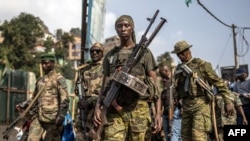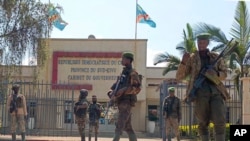A Rwandan government minister and the spokesperson of the M23 rebel group were sanctioned Thursday by the United States for alleged involvement in the recent conflict in the eastern Democratic Republic of Congo.
This comes after M23 fighters on Feb. 16 marched unopposed through Bukavu, three weeks after taking over Goma — eastern Congo’s biggest city.
The recent advances made by the group were not surprising, as the DRC, the United Nations and many foreign governments say the fighters are heavily armed and supported by Rwanda, a country with a strong military force, analysts told VOA.
Sasha Lezhnev, senior policy adviser at The Sentry, a Washington NGO, who specializes in U.S.-Africa policy on human rights and conflict, cited numerous United Nations investigative reports over the last three years showing that Rwanda is arming and supporting the M23.
“The latest report in December stated that Rwanda had three to four thousand of its own troops in the DRC,” Lezhnev said.
While Rwanda denies the allegations, Lezhnev said this crisis would have been preventable if the outside world had not recently taken its eyes off the situation.
“They [Rwanda] started rearming and reorganizing the M23 about four years ago and, back in 2023, the United States brokered an intelligence-sharing agreement and even sanctioned some Rwandan generals for supporting the M23,” Lezhnev said. “Then Rwanda basically responded, promoting the generals and continuing to escalate the situation, as well as the DRC reneging on its promise to stop arming and supporting the FDLR.”
Rwanda’s President Paul Kagame accuses the DRC of backing FDLR — the Democratic Forces for the Liberation of Rwanda, a Congo-based, mainly Hutu rebel group that includes some fighters who were involved in Rwanda’s 1994 genocide.
The Tutsi-led M23, short for the March 23 Movement, first seized control of Goma in 2012. The group was pushed back the next year by the Congolese army, some of its regional allies, and special operations forces of the U.N. Stabilization Mission in the DRC.
The group has been among more than 130 armed groups operating in the eastern DRC, mainly in the North and South Kivu provinces, vying for control of valuable and abundant mineral wealth including gold, diamonds, uranium and copper, as well as coltan and cobalt, major components in batteries used in electric cars, cellphones and other electronics.
Claude Gatebuke, a Rwandan genocide survivor and coauthor of the book Survivors Uncensored, said Rwanda is not the only backer of the M23.
“It’s Rwanda and Uganda under the leadership of Paul Kagame and Yoweri Museveni who are invading Congo to provide access to Congo resources to ... mostly Western multinationals. This is all well documented,” Gatebuke said.
Mvemba Phezo Dizolele, director of the Africa program at the Center for Strategic and International Studies, based in Washington, called the situation confusing.
“Uganda has troops in DRC that are fighting conjointly with the Congolese, against the ADF, the Allied Democratic Forces, an Islamist Ugandan group based in that part of the country,” Dizolele said. “It’s confusing in the sense that on one level, Ugandans are collaborating with the government of DRC ... and on other hand, they’ve been reported to be engaged in this instabilization [instability], as well.”
Uganda’s President Yoweri Museveni recently said he is ready to assist with peace initiatives in the DRC.
M23 leaders have said they plan to go all the way to Kinshasa.
“We ... do not know fully what they want, so it’s gone anywhere from, ‘Are they only trying to hold part of the Kivus and surrounding areas and set some kind of domination there?’ Or are they willing to go to Kinshasa?” Dizolele said.
Gatebuke added: “For sure they are trying to carve off the Kivus. The problem that they have, they would’ve been able to do this a long time ago had it not been for the Congolese not wanting to be in separate countries. … So, they are going to try to keep that area by force for as long as they can ... set up their own government and pretty much try to run a parallel country inside of the [DR] Congo.”
A statement posted Feb. 17 on X by the M23 reiterated the group’s call for a direct and sincere dialogue with the DRC government.
Speaking at the Munich Security Conference last week, DRC President Felix Tshisekedi criticized the outside world for not taking action against Rwanda in light of the escalating violence in his country.
On Thursday, a Rwandan government minister and the spokesperson of the M23 rebel group were sanctioned by the United States for their alleged involvement in the recent escalation.
In response, Rwandan Foreign Minister Olivier Nduhungirehe told VOA the recent sanctions are unjustified.
“This kind of punitive measures cannot contribute toward peace and stability in our region,” Nduhungirehe said.
The government also says the country’s only aim is a secure border and that for the last three years, the conflict has involved hostile forces — including Congolese armed forces and FDLR — that have not been sanctioned.





